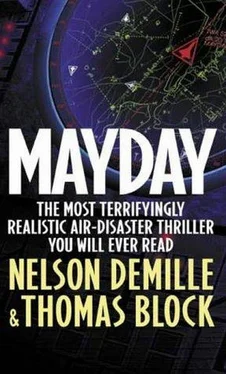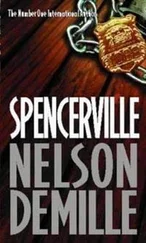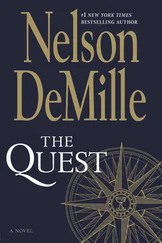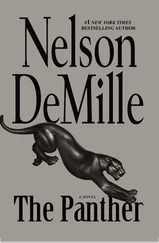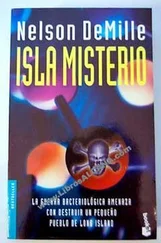Nelson DeMille - Mayday
Здесь есть возможность читать онлайн «Nelson DeMille - Mayday» весь текст электронной книги совершенно бесплатно (целиком полную версию без сокращений). В некоторых случаях можно слушать аудио, скачать через торрент в формате fb2 и присутствует краткое содержание. Жанр: Триллер, на английском языке. Описание произведения, (предисловие) а так же отзывы посетителей доступны на портале библиотеки ЛибКат.
- Название:Mayday
- Автор:
- Жанр:
- Год:неизвестен
- ISBN:нет данных
- Рейтинг книги:4 / 5. Голосов: 1
-
Избранное:Добавить в избранное
- Отзывы:
-
Ваша оценка:
- 80
- 1
- 2
- 3
- 4
- 5
Mayday: краткое содержание, описание и аннотация
Предлагаем к чтению аннотацию, описание, краткое содержание или предисловие (зависит от того, что написал сам автор книги «Mayday»). Если вы не нашли необходимую информацию о книге — напишите в комментариях, мы постараемся отыскать её.
Mayday — читать онлайн бесплатно полную книгу (весь текст) целиком
Ниже представлен текст книги, разбитый по страницам. Система сохранения места последней прочитанной страницы, позволяет с удобством читать онлайн бесплатно книгу «Mayday», без необходимости каждый раз заново искать на чём Вы остановились. Поставьте закладку, и сможете в любой момент перейти на страницу, на которой закончили чтение.
Интервал:
Закладка:
Retired Rear Admiral Randolf Hennings leaned heavily on the rail that ran along the passageway of the 0–2 deck of the Nimitz ’s superstructure. The passageway was deserted, and it would most likely remain that way for some time. He looked up at the two white stars painted above the stairwell designating the Admiral’s Passageway. This passage was off-limits to anyone of lesser rank without a specific duty there. It was another of the Navy’s long-standing traditions to have an uncluttered passageway for an admiral. Hennings had always realized how anachronistic things like that were. Pointless traditions. But he also knew how much he enjoyed them. Codes of honor. Allegiances and oaths of duty. They were all manufactured from the same need, and they all served the same end. But they were artifacts of a vanished world, and like him, they belonged in a museum… or a tomb.
Hennings let out a long breath. He rubbed his fingers along the rope-lined handrail. Just the feel of the twisted hemp brought back a flood of memories. The South Pacific-or the South Seas, as it was called in old days. Blue water, sunny skies, palm-lined beaches, and the young officers in their tropical tan uniforms. Standing on the decks or sitting in the wardroom, listening to senior officers telling firsthand stories of the war. The great sea battles and the amphibious assaults. But those memories were tainted now. Like a submarine breaking through the surface of the sea, one word kept rising through the depths of his mind and formed on his lips: “Murder.”
Hennings descended slowly down the deserted gray passage, then opened a hatch and stepped out onto the sunlit flight deck.
A moderate breeze swept the wide expanses of the nearly deserted deck. Seventy-five yards forward of the conning tower sat the S-3 transport. The pilots were giving it a final line check. An orderly had already collected Hennings’s luggage from his stateroom, and it was sitting near the baggage door. It seemed so long ago that the S-3 had brought him here. Hennings turned and walked away from the aircraft.
The Pacific sun lay directly astern of the ship, and the asphalt flight deck gave off waves of undulating heat. He spotted a seaman working near the aft starboard elevator, and he turned to avoid him. He crossed the deck diagonally and walked toward the fantail. He approached the edge of the deck and stood with his hands on the chain rail. Below, he could see the white foaming wake left behind by the giant nuclear-powered carrier. Straight down, mounted on the stern, a huge American flag hung from its mast. The flag snapped nicely in the wind, its bright colors standing out against the white wake.
Randolf Hennings thought about his wife, Mary. He had spent most of their thirty-nine years of marriage away from her. And with her death coming so soon after his retirement, he had never really had the time to do the things with her that he had put off for so long.
He thought about his friends. Most of them were dead, some in battle, some from natural causes. The remainder were living out their lonely retirements. As a Navy man, he had no roots, no hometown, no family that knew him.
More and more he had come to understand that he was not only lonely, he was an anachronism as well. He had always believed that today’s scientific advancements and solutions were going to require some unexpected and unacceptable payments tomorrow. Now he realized that tomorrow was here. And today’s situation ethics as practiced by James Sloan, often led to more unhappiness and more dire consequences than yesterday’s rigid moral code. It was this runaway technology, with no clear sense of ethics and no accountability, that killed the Straton and everyone aboard her. That killed Peter Matos. Hennings had tried to fit into the new scheme but had succeeded only in being an accessory to a monstrous crime.
He had heard the S-3’s engines starting on the forward service elevator 200 yards behind him. They would be looking for him soon. Captain Diehl and a few officers and men would assemble quickly to pipe him off, then get back to more important duties.
Randolf Hennings stared into the churning wake. He thought of those officers he knew who were buried at sea, and whose lives had ended in the sea. They had lived shorter lives than his, but had died before anything could erase their heroic deeds.
Someday, he believed, on the Judgment Day, the sea and the earth would give up its dead, and give up its secrets as well. Then men would point to their murderers, their torturers, to those who falsely accused them, to those whose negligence and stupidity had caused their deaths. Then God would judge each man in turn and mete out a fitting punishment.
He heard the ship’s address system call his name in the distance.
Randolf Hennings slid beneath the chain rail and strode purposefully to the edge of the ship’s fantail. Without breaking stride he stepped from the carrier’s deck, fell past the safety net, past the unfurled American flag, and dropped unnoticed into the white wake of the USS Chester W. Nimitz.
16
John Berry’s shoulders ached from the strain of hand-flying the Straton, and his body was beginning to react to the beating it had taken during the violent descent and his battle with McVary. Bruises covered his face and arms, and there was a stiffness in his joints. His head was beginning to throb, and his eyes were blurry. He looked down at the fuel gauges. Less than one-eighth remained in the tanks. “What time is it?”
Sharon looked at her watch, set to San Francisco time. “It’s five minutes to six.”
The autopilot disengage light glowed a steady amber, as it had done for the last three hours. Berry felt an irrational anger at the malfunctioning machine. “Sharon, take the wheel.”
She reached out and took the wheel in her hands.
Berry stretched his arms and legs, and rubbed his burning eyes. The life vest was becoming uncomfortable, but at 900 feet-less than one minute to the water-he thought everyone should leave the vests on. “The first one to see land gets a bottle of champagne, just like on a ship.”
“And I get dinner in New York if we make it to the airport.”
“Right. And Linda…” He turned his head. “What do you want when we land?” Berry was sorry he’d brought it up.
Linda Farley looked up from her chair and shrugged. “I want something to drink. And I want to see if my mother… is… is okay.”
Berry turned back to the front. He looked out the windshield at the ocean. The sea was becoming calmer, but there were still occasional high, rolling waves, any one of which could swamp the Straton if they ditched. The sky was dotted with white cumulus clouds-signs of fair weather-but that could change at any time. His prediction of sighting land no later than six o’clock raised their hopes too high. Sharon and Linda seemed to hang on his words. He’d have to be more guarded in what he said from here on.
He looked down at the radio console. Using the charts he’d found under the copilot’s seat, he had set the captain’s navigation radio to the Salinas Station frequency, south of San Francisco. Sharon had set the copilot’s navigation radio to San Francisco Airport. The radios-which were more like electronic compasses than voice radios-had a limited range, but Berry thought that they should be close enough to receive a signal from either of those airports-unless he was so far off course that he would never be within range of them. “Do you see any movement in the needle there?”
Sharon Crandall looked down at the bearing indicator on the copilot’s navigation radio. “Nothing.”
Perhaps, thought Berry, the antenna cables to those radios were severed along with the voice radios. Voice communication was not that critical for a landing, but unless he could get a good radio navigation signal, and lock onto it, he would not be able to get a bearing for the final steer toward the airport.
Читать дальшеИнтервал:
Закладка:
Похожие книги на «Mayday»
Представляем Вашему вниманию похожие книги на «Mayday» списком для выбора. Мы отобрали схожую по названию и смыслу литературу в надежде предоставить читателям больше вариантов отыскать новые, интересные, ещё непрочитанные произведения.
Обсуждение, отзывы о книге «Mayday» и просто собственные мнения читателей. Оставьте ваши комментарии, напишите, что Вы думаете о произведении, его смысле или главных героях. Укажите что конкретно понравилось, а что нет, и почему Вы так считаете.
